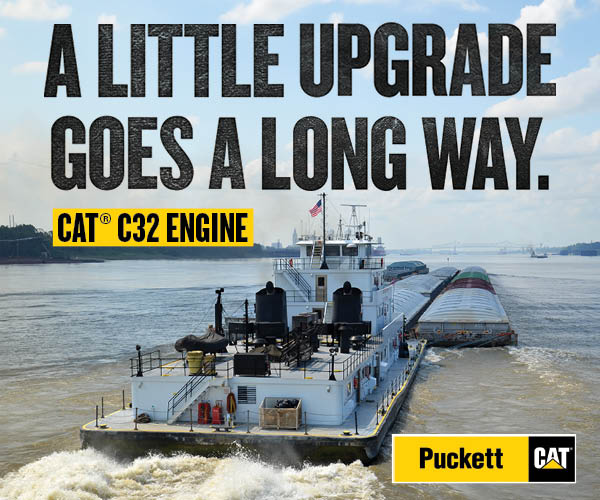IMX Panel Zeros In On Shipbuilding Revival Plans
“Anything that affects the [maritime] system affects us,” said Brian Mueller, CEO of Heartland Companies, one of the nation’s largest barge-builders. “In an emergency, there may not be enough blue-water vessels to carry U.S. exports, which would mean fewer barges needed as well.”
Mueller was speaking a member of a panel focused on recent efforts to support U.S. shipbuilding. Jim Kearns, special counsel in the maritime law practice of Jones Walker, moderated the panel discussion, which also included David Gilmore, director of the Office of Marine Financing at the Maritime Administration (MarAd), and Pam Maxwell, director of programs and operations at We Work the Waterways. The panel was part of the education lineup at the Inland Marine Expo (IMX), held May 28-30 in Nashville, Tenn.
Kearns noted that the maritime sector is receiving more federal attention than at any time in the last 50 years. Gilmore said that when he started as a maritime attorney in the 1990s the sector was “badly neglected.” The current level of attention is “once in a generation,” he said. MarAd is deeply involved in current conversations around reviving shipbuilding and the maritime sector, in the ongoing development of the SHIPS For America Act and the president’s recent executive order on shipbuilding.
Both intiatives refer to several MarAd programs by name, and MarAd personnel have been providing technical assistance to members of Congress on the SHIPS Act. The National Security Council has asked MarAd for draft legislation to implement the shipbuilding-focused executive order, and “we’re working on it,” Gilmore said.
“Now is the time to talk to your representatives in Congress,” he said. “Public input is important.”
Kearns asked how all this attention is affecting the inland waterways. The SHIPS Act and the executive order, Kearns noted, are presented as matters of national security. He asked the panelists what the effects on brown-water traffic would be if the United States were shut out of blue-water trade.
Mueller said, “The president’s EO is geared toward military readiness. We are watching the SHIPS Act closely. It’s still in committee in both the House and Senate. We are interested in discussions around tax incentives like investment tax credits, although so far there are no carve-outs for inland or coastwise vessels as the bill is currently written. One proposal is for a 33 percent investment tax credit for anyone who buys a U.S.-flagged vessel, with a bonus tax credit if the vessel is insured by a U.S.-based P&I marine insurer, with another 2.5 percent credit if the vessel is classified by ABS. On the shipyard side, there is a proposal for a 25 percent credit for qualifying shipyards.”
Mueller noted some concern about shipbuilding capacity. The industry is currently building 300 to 350 barges a year. He said, “Heartland has done a lot of study on this. We’re not fully ramped up today, but when we are, I’m confident we [U.S. shipyards] can produce up to 650 hopper barges a year.” Mueller added that some in the industry believe the hopper fleet is overbuilt by 1,000 or 1,200 barges. He added that the cost of barge-building has risen between 35 percent and 40 percent in the past five years. “The prices of steel and labor—the two components of a barge—have both gone up and are not likely to go back down,” he said.
Who Will Work?
All these proposals about reviving shipbuilding and the blue-water U.S. merchant marine inevitably led into the question of where these crewmembers and shipyard workers will come from, given the decline of preparation for careers in the trades. Maxwell spoke about the founding of We Work the Waterways, which conducts awareness and outreach programs among students and young people.
“We partner with companies like yours,” she said, describing “industry interaction days” and other events that inform young people of the exciting and well-paying career opportunities in and around the waterways.
We Work the Waterways targets all age levels, from grade-schoolers to high-schoolers and community college students. Kearns noted that MarAd has a workforce development program, and Gilmore said, “High school may be too late to start talking to kids. The earlier they hear about these opportunities, the better.”
Maxwell told of a recent high school graduate who previously worked at a gas station and who was recently hired as a deckhand by Magnolia Marine after learning about opportunities in th maritime industry at a We Work the Waterays event. At another event, when a group of students was asked what their takeaway was from the presentation by barge industry representatives, one student answered, “That I’m important, and I matter.” Maxwell recently met in Washington D.C. with key sponsors of the SHIPS Act. She said Sen. Mark Kelly, a sponsor, told her, “We need our members of Congress to hear from you and your supporters. We live in a time of short attention spans. Keep reminding people that you are there.”


